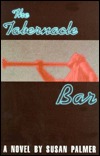 Author: Susan Palmer
Author: Susan Palmer
Title: The Tabernacle Bar
Signature Books, 1997
Novel
(Reviewed by David Harris, Sept. 4, 2018)
This excellent first novel is set in the fictional Northern Utah town of Bridger, which is probably modeled on Logan, the only town in that area with both a university and a temple.
At the beginning of the novel, Jessie Cannon, the black sheep of a pious Mormon family, becomes the sole heir to her grandparents’ home and orchard when her grandfather, the stake patriarch, passes away. She uses these as collateral to buy a local bar, which irks her hyper-sensitive family.
During the course of the novel, we get to know a number of the residents of Bridger, some of whom are Mormons and others of whom have pointedly rejected that belief system. The two groups don’t always get along, and Jessie, in particular, seems to take pleasure in taunting the faithful.
Added to the mix are a group of professors and foreign students from the local university who frequent Jessie’s bar on any given evening, along with a couple of Basque sheepherders on the lam from Elko, Nevada; where they long ago committed a crime. (These shady Iberians figure prominently in the plot and are always hovering malevolently in the background.)
I think the town Palmer has created here, together with its colorful cast of characters, can be viewed as a Utah version of Mayberry, North Carolina; the quirky hometown of Sheriff Andy Taylor and his bumbling deputy, Barney Fife. It’s a place I’d love to spend some time in.
One thing I really like about the book is that Palmer has managed to paint a fair portrait of Mormons while allowing her characters to make some pretty pointed criticisms of the religion or, at least, of Mormon culture. The conversations the characters have about this topic seem genuine to me without being unnecessarily mean. Another perspective on Mormonism is offered when, at one point, Jessie opens the file cabinet her grandfather left behind in the house she now owns and looks over some of the letters patriarchal blessing recipients have sent to the old patriarch over the years in which they have thanked him for the way his insights have blessed their lives in the years following their receipt of the blessings. Although she is a dedicated dissenter, she is moved by the letters and shares this experience in a later conversation with her bartender, an emotionally mature proponent of Eastern philosophy who, throughout the novel, acts as a check on her tendency to rail against her religious family members.
I want to add that this author possesses an eloquent writing style and that certain passages of the book read like poetry. This is particularly true of scenes set in the surrounding canyons and mountains of Bridger and also of chapter 20, which is a short interlude in the action where the dreams of a number of characters are described in short snippets as they sleep.
PS I picked up this book from Benchmark Books’s sales tables at Sunstone 2018 along with a number of other fiction titles and poetry. I was pleased to find something from an author I had never heard of before. As far as I can tell, this is her only novel, although the cover blurb mentions that she was working on another book at the time this book was published. Apparently she has yet to finish it.
PPS My mother grew up in Logan, where she knew a Fred Baugh who owned a building in which a bar was in operation. He was the bishop of her local ward and a big help to her immigrant family. He was not the owner of the bar but only rented space for it. Still, he apparently got a lot of flack from the faithful for allowing the bar to operate. Presumably the author knew something about this situation. I’d be interested in learning more about what she knows and comparing notes.

I volunteered to read and review this book for the old AML-list review program, run by Jeff Needle, in 1997. I was impressed by it, but I was completely stumped on what to write for the review, and I was never able to do it, which I always felt guilty about.
I was the AML Short Fiction award judge in 2002, and chose Palmer’s short story “Breakthrough”, which appeared in Sunstone. I wrote, “Palmer has crafted a delightful story, full of humor and good sense, in which she presents a unique perspective on the way the Spirit (or at least the wiser parts of our inner nature) communicates.” I don’t remember it well, but I think, like the later part of this novel, it was written from a post-Mormon perspective, but approached Mormonism fairly. I heard that Palmer was very amused that AML gave her an award.
Palmer wrote a couple of other speculative fiction pieces around 2000-2002, and she was a reporter for a Eugene, Oregon newspaper for years, but I don’t think she has written any more novels.
Here is an excellent review of the novel, by Sally Bishop Sigley, that appeared in Dialogue. https://www.dialoguejournal.com/wp-content/uploads/sbi/articles/Dialogue_V32N01_199.pdf